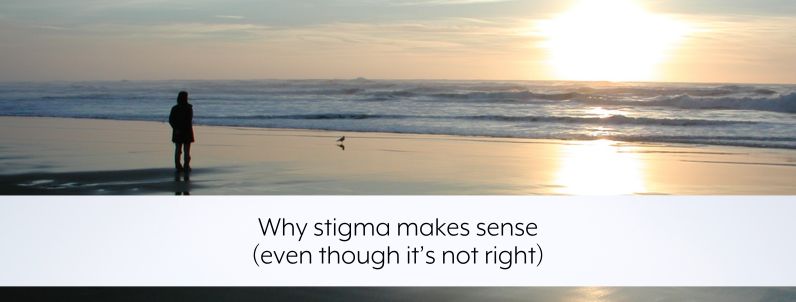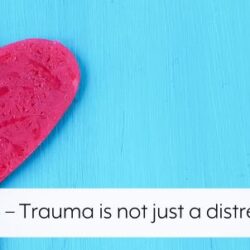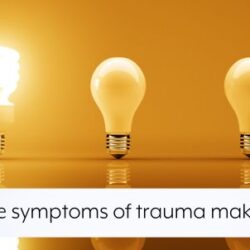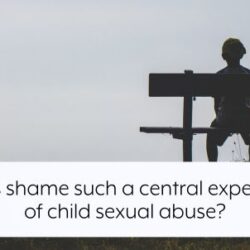
Stigma is the double-whammy of life after trauma. Not only do we suffer abuse in childhood, perhaps resulting in a post traumatic or dissociative disorder in adulthood, but then we are stigmatised, shunned and shamed for it too.
How can that be right?
And so what on earth do I mean, then, with my title, that stigma makes sense?
Stigma stinks. Stigma basically means a ‘mark of disgrace’. It is a way of society marking who’s ‘out’. It goes hand-in-hand with victim-blaming and is fed by the shame-shifting of grooming, whereby the perpetrator, who ought to be ashamed, feels no shame and instead passes it to their victim, who is innocent and yet shamed.
It feels like it’s one thing for the perpetrator to do that, but why does society join in on the act? Why do we have this ‘mark of disgrace’ simply because evil people committed evil acts upon us when we were children? It’s not our disgrace – it’s theirs!
I’ve always understood this in terms of society not being willing to side with the victim, because then it would have to share at least in part the guilt of the perpetrator, that it has failed to protect children from abuse, and failed even more spectacularly to provide for survivors as adults, in terms of adequate support and treatment. By blaming the victim, society can turn a blind eye. It doesn’t need to acknowledge the scale of abuse, the extent of trauma, the vast arena of suffering for such a vast number of people.
It’s a reasonable understanding of the situation. But I think there’s another layer: an explanation rooted actually in our evolution.
Because, what if stigma is an evolutionarily adaptive mechanism?
I’m talking here about the idea that we have evolved as a species to operate in groups, that we survive best when we stick together. From the monogamous pairing of a procreative couple, to the family unit, the tribe, the clan and the nation, we are safer when we have others to support us and protect us, when we can mate and split childcare, when we share crops and tools and expertise in medicine and technology.
For stone age man, without the benefits of modern-day antibiotics and medical knowledge, infection was the big killer. A clash over resources with a neighbouring tribe could lead to a blade in the flesh. That wound could open the way for bacteria to attack. The immune system would kick into play.
With the immune system comes inflammation. And with inflammation comes ‘sickness behaviour’: when we’re fighting off bugs, we feel unwell, we become tired, we want to sleep, we want to withdraw from normal social activity, we want a ‘duvet day’.
This allows our body to divert precious resources to fight the infection. Our ‘sickness behaviour’ is not caused by bacteria. Our ‘sickness behaviour’ is directly as a result of our immune system response to the bacteria. Scientists have seen this in mice. When they inject them with cytokines – immune-system messengers which signal inflammation to the rest of the body – the mice show the same sickness behaviour as if they had actually been infected with bacteria. There doesn’t need to be bacteria for the body to produce sickness behaviour. There just needs to be the immune response.
And so some researchers now suggest that depression looks an awful lot like ‘sickness behaviour’ – no energy, loss of desire to do anything, flat emotions, wanting to sleep – and that it is driven by cytokines and the immune response. In other words, depression is an immune reaction.
The thinking goes that depression is therefore adaptive. It’s an attempt to divert resources to responding to threat. It makes us low and slow so that our body can focus on its immune response.
Where it’s gone wrong for us in the 21st century is that the inflammation is not caused so much by bacteria and viruses but firstly by stress: stress hormones are incredibly inflammatory – they prepare the body to defend itself from injury, so inflammatory cells are pumped throughout the body in anticipation of attack, even when no attack is forthcoming, because the threat is in our mind rather than in our physical external world. And secondly diet: much of our Western diet is highly inflammatory, especially gluten, dairy, processed food and even moderate to high levels of carbohydrates.
High levels of stress plus a toxic diet equals high levels of inflammation. And when our bodies and brains are inflamed, they trigger us to engage in ‘sickness’ behaviour: to retreat to our beds, to do nothing, to hide and be still, to spend our resources on healing and recovery rather than on activity and attack.
It’s one theory for some forms of depression but it’s one that’s beginning to gain traction. So depression isn’t ‘all in the mind’: it’s all in the body. It’s a real, physical process, albeit one driven by largely psychological causes.
What has this got to do with stigma?
One of the curious things about sickness behaviour is that it involves a disengagement with normal life. You’d think that you could just fight infection, or produce an inflammatory immune response, whilst continuing to chat to people and doing everyday life. Maybe don’t go out on a strenuous hunt, but you could still hang out with your buddies, surely? And yet with sickness behaviour, one of the first things that is affected is our innate desire to be sociable. In depression, we don’t want to ‘do’ people. We generally want to be left alone. Talking is an effort. Engaging in life is an effort. Friends say to us, You ought to get out more! and we can’t think of anything worse. Just let me sit here in the dark under my duvet and don’t bother me, is what we think instead. We withdraw.
Depression, inflammation, sickness behaviour: it all switches off our ‘social engagement’ system. There’s life over there – the big party of everyday activity with other people laughing and smiling and talking and basically just getting on with it. And here’s us over here – quiet, no energy, no joy, no desire to do anything at all, other – maybe – than sleep.
Think of this in tribal terms. There’s the tribe, engaging with each other. And there’s you, in your cave or your tent. Alone. Not wanting to engage.
Stigma is when people are whispering about you, pointing at you sideways, feeling your difference. They start to avoid you. You feel isolated and ostracised.
And how could this be adaptive?
Because infection is such a threat to life for stone age man. If you’re inflamed, if your body appears to be fighting an infection, then it’s probably best if everyone gives you a wide berth. Evolution, the drive to survive, has manoeuvred you away from the tribe. It’s put you out of the way, on your own. Your instinctive, gene-driven sickness behaviour has done that. And it seems to be a ‘survival of the species’ thing: get the sick person out of the way so that they don’t infect everyone else.
In the same way as you are instinctually driven to withdraw from the group when unwell, so the rest of the group is instinctually driven to avoid you, to safeguard their own welfare.
When we’re struggling with a mental health issue (like depression, like the after-effects of trauma) we often want to scream at people, I’m not contagious you know! You don’t have to avoid me! Because we find that people would rather cross the road to avoid us than have to talk to us.
For a long time I thought this was simply because people didn’t know what to say. Or because they didn’t care. (Or being entirely honest, because they hated me.)
But I’m beginning to understand stigma now in much more primeval terms. At many levels, there’s nothing intentional or even conscious about it. It’s people’s natural response: avoid the sick person so we don’t get sick too.
Of course depression or trauma isn’t infectious. But that’s not what their genes are telling them. They’re operating instinctively on a ‘better safe than sorry’ basis. They’re operating below consciousness. In exactly the same way that you’re operating out of instinctive, evolutionary behaviour to withdraw and go quiet and still and to feel no joy or drive to do anything when you’re inflamed.
You can’t suddenly feel better for shouting at yourself, There’s no actual bacteria here, you know, brain! You’re reacting to the possibility of threat, but there isn’t actually any threat. So stop spewing out cytokines! And the same is true for people instinctively engaging in stigma behaviour. Their bodies and brains are just trying to keep them safe. They’re wrong, of course. But then so are we for thinking that the best way to guard against tomorrow’s scary social event, or deadline, or showdown at work, is to react in our bodies with inflammation.
The reality is that our bodies and brains evolved over millions of years and modern life has changed too rapidly for them to catch up.
Stigma is wrong, but it is natural. I’m not excusing it. We should be working against it. But I am trying to understand it. I’m trying to make sense of why so many otherwise caring and good-natured individuals avoided me when I had a mental health breakdown. I’ve always suspected that something other than deliberate prejudice was driving their actions. The immune system theory of ‘sickness behaviour’ is one explanation, and so I throw it out to stimulate our thinking. I’m not saying it’s right. I’m not saying it should be like this. I’m just curious about the neurobiology of trauma: not just our own reaction to trauma, but the reaction of others to our reactions.
Fascinating, isn’t it?



4 Comments
This is fascinating and something that I have experienced a lot of. People either want to ‘fix me’ or avoid me. It’s only the very good friends who have spent time getting to know me, who realise I’m not contagious, I’m just battling. But in general the stigma still lies there, and then self-stigma kicks in too! Particularly when it repeats trauma patterns. Super ego kicks in.
Thanks for this Carolyn.
Yes…..very thought provoking…I think a lot of modern ‘ills ‘ come from such rapid ‘progress ‘ which we haven’t had time to adapt to….and maybe a lot of it is not progress??
I like what you are saying….I have been thinking about it a lot as I have struggled to understand people’s reactions…especially the ones I would expect to know better ( my colleagues from healthcare!)….so it helps me to feel kinder towards them…to understand their struggles and not just feel angry and resentful…and it’s enabled me to reach out to someone who I assumed had rejected me…to just give her a way back…and it’s had a positive result….so thank you!
It is fascinating. But as someone who grew with evolutionary psychology being used to justify – and I do realise you’re not doing that here – all kinds of inhumane things, I’ve definitely moved way past it in terms of my thinking. There’s a reason it’s regarded with a lot of suspicion, as a field.
All of the above does make evolutionary sense. But so does supporting the ill/traumatised members of the group, in order to increase their chances of survival, in order to maximise the number of people around to support the people doing the caring now, when things go wrong in *their* lives. It is said, after all, that altruism can be explained almost entirely by game theory.
Which doesn’t make it less real, but does mean there is room for it within evolutionary psychology, and therefore most people who appeal to evolutionary psychology to explain a lack of compassion are being suspiciously selective.
And if it were that natural to abandon the ill and disabled, we wouldn’t have evidence, stretching back tens of thousands of years, of them being cared for by other group members. There’s evidence of *neanderthals* exhibiting that behaviour.
I don’t think that by combatting stigma we’re fighting nature; the evidence for that idea simply isn’t good enough, even if we do go with a solely evolutionary perspective.
Our society is bigoted towards the sick and the abused, and that makes the biggest difference. Possibly tied with the Just World fallacy, which may, in fairness, have developed as a response to the evolutionary glitch of us being more aware of our own mortality than we are emotionally equipped to deal with it. But that needs deconstructing directly; appealing to empathy over specific problems caused by it doesn’t seem to work, because the underlying belief remains intact. And since not everyone buys into it, it must a common pitfall that people could be educated and counselled out of, rather than an inevitability.
This societal and cultural discrimination both encourages individual members to turn their backs on those in need, and robs those who might otherwise be supportive of chances and resources to learn how to show their support, meaning that many panic and withdraw. They just don’t have the social skills. The good news being that they can be taught. The bad news being that due to prejudice against abuse victims and disabled people, there isn’t much political will to teach that kind of thing. The internet helps enormously, though; I’ve seen quite a few productive discussions between the affected and the unaffected on how to be a good ally or friend/partner/family support.
I actually don’t have a huge problem with evolutionary psychology when it’s used properly, and includes all human behaviours, not just the abusive ones, but it rarely is.
I hope your thinking over these things continues to be constructive for you. All the best.
Am reading this in 2021 and wonder if there could be a way to integrate both Carolyn’s evolutionary take on stigma and L’s : in my experience, people do rally first around an previously well person who becomes ill (physically or mentally)..but if that person’s illness drags on, then others withdraw. There is a sense that efforts will now be spent in vain, that the sick one should now be over it and if not, are beyond help, or should help themselves. The sick person feels abandoned and unfit, not just literally anymore but also as a human being. It could be that the group first has an evolutionary advantage to nurse the sick back to health, but that if nursing doesn’t work fast enough, this is a sign that the sick one is now using valuable resources in vain and therefore can be abandoned?